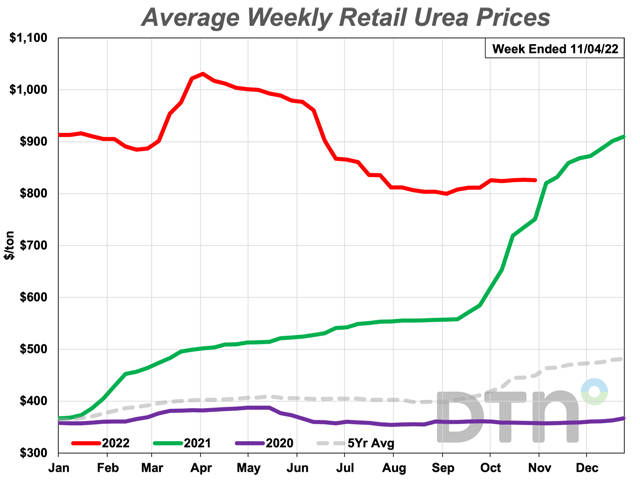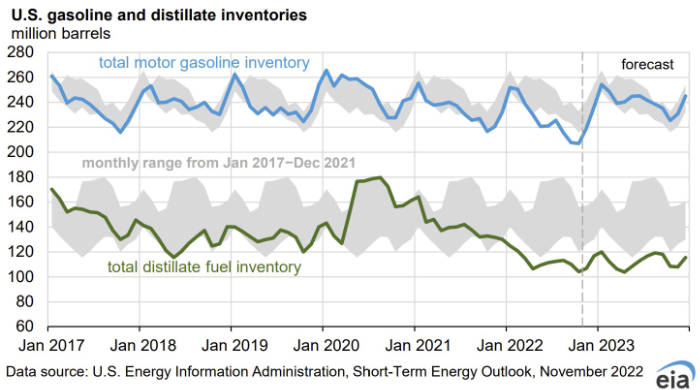In short:
- East Coast and Gulf Coast on alert for more tropical activity, while the south and east US could flood.
- EIA expects US gasoline prices to start falling in Nov and be flat through 2023.
- Some Generac generators recalled after finger amputations.
Wheat products, lunch meat, lettuce, and eggs are more expensive; US gasoline prices could start to fall in Nov; Excess inventories could mean big discounts this holiday season
The price of certain foods has peaked, but prices of cereals, baked products, lunch meat, lettuce, and eggs have risen:
October #Food Prices, Food at home. pic.twitter.com/K699J6jA1c
— FarmPolicy (@FarmPolicy) November 10, 2022
The average retail price of most fertilizers continues to trend downward:

EIA expects US gasoline prices to resume their decline in November, as refiners increase production to meet distillate demand and gasoline inventories begin increasing. Prices could stay relatively flat for the rest of 2023.

One silver lining of inflation? Excess inventories. We could expect some huge discounts, this holiday season.
BQ.1 and BQ.1.1 will be dominant, and are resistant to antivirals; Moderna’s bivalent booster works well against Omicron variants; US Covid emergency declaration in place until mid-Jan
The new BQ.1 and BQ.1.1 variants made up 44% of new cases last week, and are expected to become dominant soon. BQ.1 and BQ.1.1 are resistant to Evusheld and likely to bebtelovimab as well, leaving people with compromised immune systems vulnerable.
Moderna’s new data shows that its bivalent Covid booster works better against Omicron variants than its original booster:
Moderna BA.5 bivalent booster results announced
(via @moderna_tx press release)
—largest study to date of >500 adults, ages 19-89
—5-6 fold higher BA.5 neutralizing Abs vs original booster
—"robust" increased nAbs vs BQ.1.1
—Table below summarizes all 7 studies reported pic.twitter.com/qjRXVf06Rm— Eric Topol (@EricTopol) November 14, 2022
Try avoiding reinfections, as each infection carries more risks:
⚠️AVOID INFECTION—Risk of death, hospitalization from #COVID19 jumps significantly with reinfection compared with 1 or no infection. Problem goes beyond vaccinated or unvaccinated. ➡️Each infection you accumulate more risk.🧵
(See Purple>>Orange>>Green). https://t.co/ZSfhxzMv3p pic.twitter.com/aEVN3ErWDg
— Eric Feigl-Ding (@DrEricDing) November 11, 2022
The US will keep its Covid public health emergency in place at least until mid-January. HHS has estimated that as many as 15 million people could lose Medicaid or CHIP once the programs return to normal operations.
2020 vibes: Cruise liner with 800 Covid cases docks in Sydney.
East Coast and Gulf Coast on alert for more tropical activity, while the south and east US could flood; Wildfire smoke causes chronic problems; CA saw an increase in dry wells this year
Accuweather warns that East Coast and Gulf Coast residents should be alert for more tropical activity. Flooding could be a concern for portions of the southern and eastern US, regardless:
There may be a window or two for a tropical system to brew in the #Atlantic before the end of the season, and AccuWeather meteorologists say that plentiful tropical moisture will keep the risk for flooding alive across the southeastern U.S. in the interim: https://t.co/r1NDg45EAW
— Breaking Weather by AccuWeather (@breakingweather) November 14, 2022
Record low temps are expected this weekend. Here’s How to survive winter emergencies. And here is how to prepare a winter survival kit last minute.
Experts say that more than a dozen record low maximum temperatures could be challenged Friday, and a handful of daily overnight low records could also be in jeopardy: https://t.co/oTNAHuXZTP
— Breaking Weather by AccuWeather (@breakingweather) November 14, 2022
Mold and contaminants left after flooding may pose health hazards. Here are steps you can take before a storm, as well as after flooding.
Wildfire smoke is causing chronic problems in Americans (paywall). Chronic exposure to wildfire smoke can cause asthma and pneumonia and increase risk of lung cancer, stroke, heart failure, and sudden death. Northern California sees more underweight and premature infants when wildfires rage. Most vulnerable are the very old and very young.
Here are the latest installments of a series that analyze different regions around the US in terms of climate change risks and future: Finding safe haven in the climate change future: The Southeast. And Finding safe haven in the climate change future: The Midwest.
California’s wells have been drying up faster this year, and thousand rely on trucked water and water bottles to survive (paywall). This year the state saw 1,351 dry wells, nearly 40% over last year’s rate and the most since 2014. The bulk of these outages cut through the San Joaquin Valley, where residents compete with deep agricultural wells for the rapidly dwindling supply of groundwater. Central Valley could see about 8,000 dry wells in the next few years.
Oregon passed a bipartisan bill to inform residents about their wildfire risks. The backlash was explosive because homeowners fear the state will devalue their properties by publicizing their fire risk.
Biden and Xi Jinping taking “baby steps” to improve relationship; Classified intelligence shows UAE tried to influence US politics
Here are NPR’s four takeaways from Biden’s meeting with China’s Xi Jinping. And WaPo’s coverage. Both leaders seem to be keen on restoring channels of communication and repairing relationships, and this meeting is considered a “baby step” towards improving relations.
CIA director warned Putin’s spy chief against the use of a nuclear weapon in Ukraine (soft paywall). Military analysts and nuclear experts have questioned whether Russia would use a nuclear weapon in Ukraine. And, if Russia took such drastic measures, some of its global allies, including China, might turn against it.
Classified intelligence shows that the UAE has engaged in an extensive effort to influence US political decisions. The UAE has exploited the US’ reliance on campaign contributions, its predisposition to lobbying firms, and lax enforcement of disclosure laws.
The rest
6500-watt and 8000-watt Generac, HomeLink and DR portable generators have been recalled after reports of finger amputations when trying to move the unit. The article has more details and a list. Here’s our review of Best gas-powered portable generators.
Heat pumps are supposed to be energy efficient, but can they save you money? The video notes have plenty of resources about heat pumps:
For the new folks that might not know, we have a Discord server! Discord is where we meet for everyday chit-chats, while the forum is best for knowledge that is meant to be accessible for longer.

You are reporting the comment """ by on